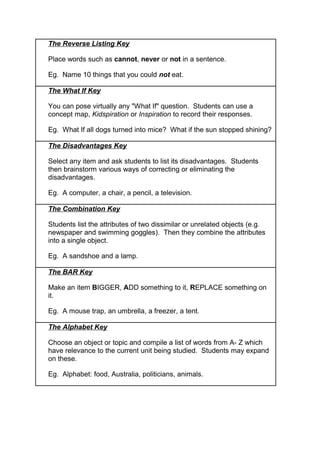
Thinkers keys description
- 1. The Reverse Listing Key Place words such as cannot, never or not in a sentence. Eg. Name 10 things that you could not eat. The What If Key You can pose virtually any "What If" question. Students can use a concept map, Kidspiration or Inspiration to record their responses. Eg. What If all dogs turned into mice? What if the sun stopped shining? The Disadvantages Key Select any item and ask students to list its disadvantages. Students then brainstorm various ways of correcting or eliminating the disadvantages. Eg. A computer, a chair, a pencil, a television. The Combination Key Students list the attributes of two dissimilar or unrelated objects (e.g. newspaper and swimming goggles). Then they combine the attributes into a single object. Eg. A sandshoe and a lamp. The BAR Key Make an item BIGGER, ADD something to it, REPLACE something on it. Eg. A mouse trap, an umbrella, a freezer, a tent. The Alphabet Key Choose an object or topic and compile a list of words from A- Z which have relevance to the current unit being studied. Students may expand on these. Eg. Alphabet: food, Australia, politicians, animals.
- 2. The Variations Key Start each question with “How many ways can you…” Students brainstorm different solutions or ways to meet the challenge. Eg. How many ways can you: make new friends; wash a giraffe, catch a lion? The Picture Key Draw a simple diagram, sketch or drawing and students work out ways to link it to the current topic they are studying. The Prediction Key Students respond to a situation or circumstance by predicting a series of possibilities. Eg. Predict what children will be like in 50 years, predict what forms of entertainment we will have in 100 years. The Different Uses Key Students list some different uses for items from their topic or theme (with an emphasis on reusing and recycling). Eg. Find 10 uses for empty plastic yoghurt containers, an old shoe, a broken radio. The Ridiculous Key Make a ridiculous statement that would be virtually impossible to implement. Students then attempt to substantiate, justify the idea by developing a case to support it. Eg. Every child should be required to pay a tax on their birthday and Christmas presents. The Commonality Key Decide on 2 objects which would normally have nothing in common, and try to find common points between them. Eg. Kurwongbah State School and a circus.
- 3. The Question Key Provide students with an answer. Students think of five questions that give only that answer. Eg. Midnight, Seaweed, Monkeys, Migrants, Koalas. The Brainstorming Key State a problem which needs to be solved. Students work individually or in groups to brainstorm a list of practical, creative or innovative solutions. Eg. Too many people eat fast food. There are too many cane toads in Queensland. There are too many homeless people in Brisbane. The Inventions Key Students may be presented with a design challenge of brief. Students can outline their ideas/ design on paper and then possibly construct their invention using a variety of materials. Eg. Invent: A new mousetrap, a grape peeler, an automatic vacuum cleaner. (This key links well with the Technology KLA- Technology Practice). The Brick Wall Key Make a statement which could not generally be questioned or disputed, and then try to "break down the wall" by outlining other ways of dealing with the situation. Eg. Every child needs to go to school to get a good education. The Construction Key Pose a construction problem-solving task and provide readily available material for students to use. Students can work individually or in groups to build their construction. Eg. Build the longest bridge using one sheet of newspaper, sticky tape and 10 straws. Children can draw a diagram.
- 4. The Forced Relationships Key Develop a solution to a problem using 3 totally dissimilar objects. Students cannot use the objects in the way they were intended to be used. Eg. You need to catch a cat with a kite, a marble and a rubber band. Children can draw a diagram. The Alternative Key Students think of a number of ways to complete a task without the normal tools or equipment. Eg. Work out three ways to take a photograph without a camera, rake up leaves without a rake, see clearly underwater without goggles. Children can draw a diagram. The Interpretation Key Describe an unusual situation. Students think of different ways to explain that situation. Eg. The clown is standing in the middle of the empty school oval.
